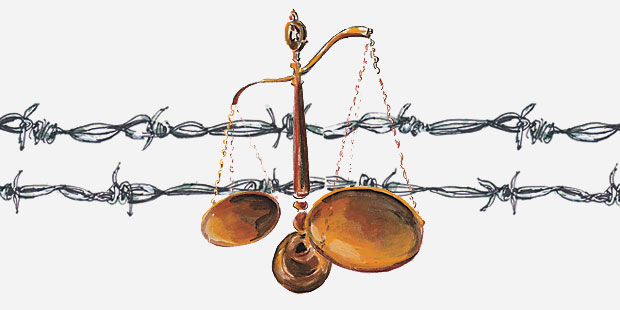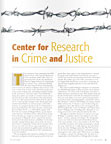Center for Research in Crime and Justice
Printer Friendly VersionThe cornerstone of the community at the NYU School of Law is the Center for Research in Crime and Justice (CRCJ). The Center, codirected by James Jacobs, the Chief Justice Warren E. Burger Professor of Constitutional Law and the Courts, and Jerome Skolnick, the Claire Clements Dean’s Chair Emeritus at the University of California at Berkeley School of Law, is the locus of many of the activities of the criminal law group, sponsoring research, hosting events, and making connections among faculty, practitioners, and policy-makers. Every Wednesday during the academic year, faculty are invited to lunch with an important decision-maker or practitioner in the criminal justice system who offers prepared remarks followed by the opportunity for a frank and open exchange of ideas. Recent guests have included Samuel Buell (’92), lead prosecutor in the Arthur Andersen case and special attorney for the U.S. Department of Justice Enron Task Force; New York City Police Commissioner Raymond Kelly (LL.M. ’74); Gifford Miller, speaker of the New York City Council; and Margaret Winter, associate director of the American Civil Liberties Union’s National Prison Project. Visitors like these go a long way toward serving the Center’s principal goal of making the school a regional and national focal point for the study, discussion, and debate of criminal justice policy. Another luncheon guest, Steven Solow (’85), former chief of the U.S. Department of Justice Environmental Crimes Section, says of his visit: “It was a great opportunity to sit around with extraordinarily thoughtful people and talk about the practical and doctrinal implications of the criminal prosecutions I have handled.”
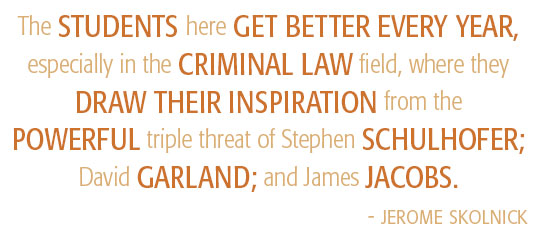
The encouragement and connections resulting from everyday interactions among the criminal law group can lead to the unexpected. Even when a guest or topic being featured at a criminal law group event “seems furthest removed from your work, it can turn out to be the most interesting and relevant,” Harry First remarks. He recalled a guest who made a presentation on the Los Angeles Police Department consent decree, surprisingly raising issues that overlapped with First’s work on the Microsoft antitrust case.
The Center’s monthly Hoffinger Colloquium on Criminal Justice similarly brings together academic presenters and an audience comprised of a cross section of the criminal justice community to debate and discuss criminal justice issues. With students sitting side by side with luminaries in the field, the colloquium has featured forays into such subjects as terrorism and the policing dynamic, incarceration trends, sentencing guidelines, and domestic violence. The colloquium is named for Jack Hoffinger, the dynamic criminal defense attorney who, for the past 50 years, has been trying cases ranging from white-collar offenses to the sort that generate New York Post headlines like “Career Girl Murders” and “Subway-Shove Psycho.” Hoffinger took over funding of the colloquium in 2001, having served on the Center’s advisory board since the 1980s.
Although not ordinarily referred to as “typical” in any way, Hoffinger is nonetheless typical of the audience for the colloquium—involved, inquiring, and energetic. His distinguished career as one of the most renowned criminal defense lawyers in the nation includes a stint as the president of the New York Criminal Bar Association, and writing and teaching on criminal law issues. Asked why he so avidly supports a law school that is not his alma mater, Hoffinger explains that “The NYU School of Law has the most vibrant and important criminal justice faculty and programs in the country today.” When Jacobs was looking for funding to continue the colloquium after the death of its original patron, Alan Fortunoff (’55), Hoffinger did not hesitate: “What the colloquium offers is a fascinating synergy of lecturers who are consistently interesting and provocative, and listeners who are staggeringly knowledgeable and engaged. For the average practitioner, the colloquium might not have practical use today or tomorrow, but you never know when the violin will play. You never know when something you learn at the colloquium will emerge as relevant.” He adds, “It’s not enough to be lawyers serving our clients. We should be helping make our criminal justice system and our society a better place, and the colloquium is an integral part of that endeavor.”
In addition to the Hoffinger Colloquium, the Center sponsors small seminars and workshops frequently to hear from U.S. and foreign criminal justice scholars who are in New York City for a short time, such as Franklin Zimring, the William G. Simon Professor of Law at the University of California at Berkeley School of Law. The Center has also provided a home and an opportunity for scholars to spend extended periods of time at the Law School to further their research efforts and interact with faculty. These visitors have included Professor Dirk van Zyl Smit, former dean of the University of Capetown (South Africa) Law School and University of Frankfurt criminologist Henner Hess.
[SIDEBAR: Applying Classroom Concepts to Crime-Fighting]
The CRCJ finds its way into the classroom by luring international scholars to teach specialized seminars to students in the upper years, under the aegis of the Hauser Global Law School Program. Cyrille Fijnaut, the leading scholar of European policing, was, at the time of his visit, a professor of criminal law and criminology at the Catholic University of Leuven in Belgium. Now at the University of Tilburg in the Netherlands, Fijnaut has taught courses on European criminal law and on the comparative history, sociology, and politics of policing in democratic societies. Fijnaut is the author of more than 20 books, including, most recently, Legal Instruments in the Fight Against International Terrorism: A Transatlantic Dialogue, a comprehensive volume of international, European, and American legal materials relating to preventing, investigating, and punishing terrorism. He came to the Hauser Global Law School Program as a result of editing, with Jacobs, a book of essays called Organized Crime and Its Containment: A Transatlantic Initiative. Fijnaut is also the founder and editor of European Journal of Crime, Criminal Law, and Criminal Justice, a new English language journal in European criminal law, and the general editor of the International Encyclopedia of Criminal Law, a series in comparative criminal law. He plans to publish a volume on the criminal laws of every major country.
Renowned Australian political theorist Professor John Braithwaite has been a vital contributor to intellectual exchange among the criminal law faculty. His special interest is business regulation and white-collar crime, and he has focused for more than 20 years on restorative justice and responsive regulatory ideas. Reference to Braithwaite’s work is virtually mandatory in any serious discussion of environmental crimes. As an author, co-author, or editor of numerous books and articles, he has contributed significant research to the application of restorative justice principles to business crime as well as to more traditional forms of juvenile and adult crime. Braithwaite’s 1989 book Crime, Shame, and Reintegration has been highly influential in demonstrating that current criminal justice practice creates shame that is stigmatizing. Restorative justice, on the other hand, seeks to reintegrate the offender by acknowledging the shame of wrongdoing but then offering ways to expiate that shame.
The CRCJ also sponsors ongoing research projects in such areas as organized crime and police accountability and integrity, offering opportunities for students to become involved in the scholarly community. “Students are vital contributors to the Center’s work,” says Jacobs, whose easy and accessible manner has lured many a student into a career in crime. “I personally have co-authored two books and more than a dozen articles with students. It was not a gift to students to involve them in my work. Rather, students have given me a gift with their energies and research efforts.”
[SIDEBAR: Former NYC Corrections Chief Argues That Prison Does Not Work]
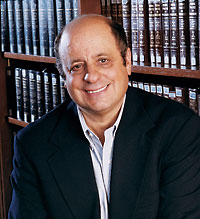 Jacobs’ gratitude to his students is more than matched by their appreciation for the opportunities. “Professor Jacobs and I co-authored an article detailing the role of the congressional hearing in the government’s efforts against organized crime,” says Elizabeth Mullin (’03), now a staff attorney at the Public Defender Service for the District of Columbia. “Working with Professor Jacobs was an invaluable experience. He was an involved and challenging mentor, whose guidance greatly improved my writing skills.” Other Jacobs protégés have similarly built on their collaboration with him, including Ed O’Callaghan (’94), an Assistant U.S. Attorney for the Southern District of New York; Coleen Friel Middleton (’97), an Assistant U.S. Attorney for the District of New Jersey; Robert Radick (’97), an Assistant U.S. Attorney for the Eastern District of New York; and Elizabeth Joh (’00), professor of law at the University of California-Davis Law School.
Jacobs’ gratitude to his students is more than matched by their appreciation for the opportunities. “Professor Jacobs and I co-authored an article detailing the role of the congressional hearing in the government’s efforts against organized crime,” says Elizabeth Mullin (’03), now a staff attorney at the Public Defender Service for the District of Columbia. “Working with Professor Jacobs was an invaluable experience. He was an involved and challenging mentor, whose guidance greatly improved my writing skills.” Other Jacobs protégés have similarly built on their collaboration with him, including Ed O’Callaghan (’94), an Assistant U.S. Attorney for the Southern District of New York; Coleen Friel Middleton (’97), an Assistant U.S. Attorney for the District of New Jersey; Robert Radick (’97), an Assistant U.S. Attorney for the Eastern District of New York; and Elizabeth Joh (’00), professor of law at the University of California-Davis Law School.
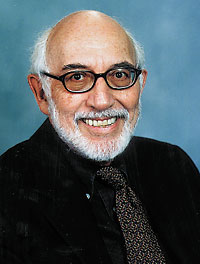 Skolnick has similarly involved students in his scholarship on racial profiling, the blue code of silence, and coercive interrogation. Skolnick’s article “Guns, Drugs, and Profiling: Ways to Target Guns and Minimize Racial Profiling” was written with law student Abigail Caplovitz (’01). “The students here get better every year,” Skolnick says, “especially in the criminal law field, where they draw their inspiration from the powerful triple threat of Schulhofer, the leading substantive criminal law scholar of his generation; Garland, the leading criminology theorist in the world; and Jacobs, the leading sociologist of criminal law.” He is currently working on an assessment of post-September 11 organizational changes in the NYC Police department.
Skolnick has similarly involved students in his scholarship on racial profiling, the blue code of silence, and coercive interrogation. Skolnick’s article “Guns, Drugs, and Profiling: Ways to Target Guns and Minimize Racial Profiling” was written with law student Abigail Caplovitz (’01). “The students here get better every year,” Skolnick says, “especially in the criminal law field, where they draw their inspiration from the powerful triple threat of Schulhofer, the leading substantive criminal law scholar of his generation; Garland, the leading criminology theorist in the world; and Jacobs, the leading sociologist of criminal law.” He is currently working on an assessment of post-September 11 organizational changes in the NYC Police department.
